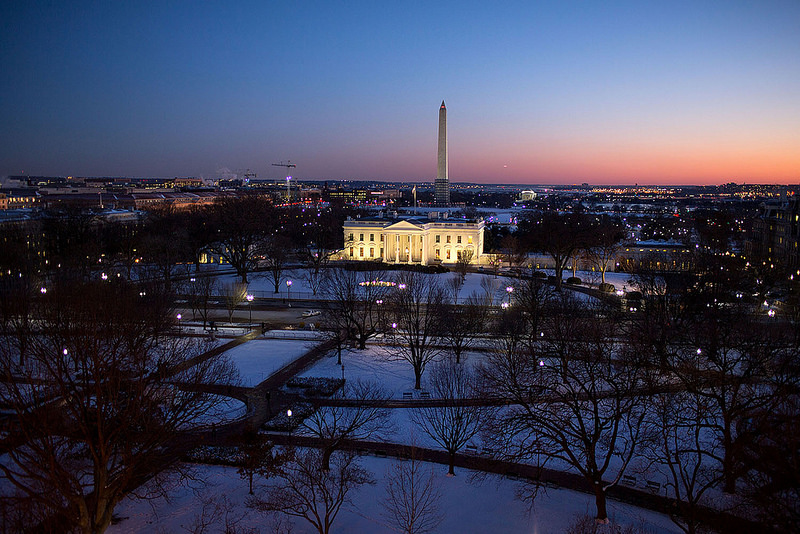Washington D.C. — Today, staff from Access Now, along with the Electronic Frontier Foundation, met with senior staffers at the White House to discuss the petition at SaveCrypto.org, which asks President Obama to make a statement in support of strong encryption. Access Now and EFF were the organizers of the petition, which was supported by dozens of organizations, companies, and trade associations, and received 104,110 signatures. Access Now looks forward to a strong response to the petition from the president before the end of the year.
“Today, we met with the senior White House staff who set the U.S. technology and cybersecurity agenda. They noted that they were drafting their response to our petition and expressed an eagerness to continue to hear the public’s concerns. We encourage everyone to share concerns about encryption directly with the White House. We strongly believe the president needs to make a clear, unambiguous statement before the end of the year,” said Jamie Tomasello, Technology Director at Access Now.
Encryption is one of the most important tools we have to protect our safety and security, yet some members of Congress have announced plans to introduce legislation to weaken encrypted products and services. Access Now and the Electronic Frontier Foundation launched the Save Crypto campaign in recognition of the need for a public declaration from the president in support of the most robust encryption tools available, and an absolute rejection of any attempts to force companies to weaken encryption.
By October 27, 2015 the petition had more than 100,000 signatures, meeting the threshold required for an official response from the White House. The petition used the White House’s “We the People” API. “We the People” is a tool offered by the Obama Administration that allows people to voice their opinions on issues of public policy. The White House has committed to responding within 60 days to any petition that obtains 100,000 signatures within 30 days.
Earlier this fall, FBI Director James Comey indicated that the administration supports “strong encryption” and would not seek legislation on encryption right now. The statement, and other unattributed remarks that followed in The Washington Post and The New York Times, failed to define what the administration means by “strong encryption,” and left the White House’s policy unclear. Earlier this week, in anticipation of an official response to the petition, senior staff from the White House (who were present at today’s meeting) took the unprecedented step of asking signatories for more information about why they signed the petition. Anyone can make a public comment through this portal.
“We are disappointed that the White House does not yet appear ready to affirm its unmitigated support for the tools that protect millions of internet users from crime, oppression, and in some cases, physical violence or death. Today we made clear, and we will continue to make clear, that we believe that encryption is critical for all people — not just the technological elite. Everyone has the right to safety and security in this increasingly networked world. We’re encouraging everyone who cares about protecting our fundamental security and trust in the internet and networked systems to help us prove that point by submitting their comments to the White House,” added Amie Stepanovich U.S. Policy Manager at Access Now.
Here are four points Access Now made during the meeting with White House staff:
- Encryption keeps us safe online. Encryption is one of the most valuable tools we have to protect ourselves in the digital world. It protects the confidentiality of sensitive transactions, like online banking, keeps us safe from criminal attacks, and ensures our basic trust in online communications.
- Encryption protects people and saves lives. In the Middle East and North Africa, for example, LGBT individuals use encryption to communicate and seek support, and to protect themselves from government persecution. In contrast, in Mexico a citizen journalist reportedly was murdered after her phone was compromised and she was revealed to be the person behind a Twitter account for reporting information about local drug cartels.
- Encryption gives us the privacy necessary for exercising human rights. The United Nations Special Rapporteur for Freedom of Expression, David Kaye, recently released a report explaining, “encryption and anonymity, and the security concepts behind them, provide the privacy and security necessary for the exercise of the right to freedom of opinion and expression in the digital age.”
- Laws to undermine encryption won’t stop terrorists from using strong crypto, but they will make all of us less safe. It’s simple. Even if Congress passed a law to weaken encryption in the United States, there would still be numerous foreign/open source crypto products on the market. Undermining encryption would not take these tools away from terrorists. It only makes it harder for average people to use them, making us less secure.
###
